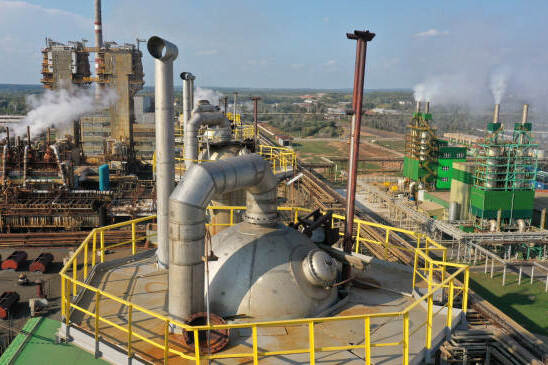Export of ammonium nitrate from Russia is restricted
The government introduced a temporary restriction on the export of ammonium nitrate. A decree of the Government of the Russian Federation was signed providing for the introduction of a temporary ban on the export of ammonium nitrate from February 2 to April 1, 2022 inclusive.

At present, an additional need for ammonium nitrate has formed in the domestic market, both from agricultural producers and industrial enterprises. In particular, in a number of regions of the Southern and North Caucasian Federal Districts, due to the warm winter, spring sowing will be shifted by several weeks and will begin in February, which is already creating an increased demand for nitrogen fertilizers.
“Thus, the restriction of exports will make it possible to provide domestic farmers with the necessary amount of ammonium nitrate during the period of its maximum purchases - from January to March, as well as prevent an increase in prices for this type of fertilizer in conditions of active demand,” said Minister of Agriculture Dmitry Patrushev.
Farmers complain about the lack of ammonium nitrate
Some agricultural producers in Russia before the sowing campaign faced a shortage of ammonium nitrate, a mineral nitrogen fertilizer used in early spring to feed winter and spring crops.
According to Andrey Morunkov, Director of Crop Production at Damate Group of Companies, the lack of this fertilizer under normal weather conditions can lead to a decrease in yield by 25-50% of the planned volume. At the same time, it is impossible to find a complete replacement for ammonium nitrate, the expert emphasized. This fertilizer has analogues, but for their application and storage, you need to purchase separate equipment, added Andrey Neduzhko, CEO of the Steppe agricultural holding, which is part of Sistema.
At the moment agricultural enterprises cannot contract approximately 60,000 tons of ammonium nitrate. The shortage of fertilizer in general is about 100,000 tons per month.
Earlier agricultural producers bought ammonium nitrate for the spring in the fall, but due to the rise in price of nitrogen fertilizers last year, they did not do this in anticipation of a decrease in the cost of production. Prices for ammonium nitrate grew due to the increase in the cost of the gas used in its production in the world.
The Ministry of Agriculture told the publication that some regions reported the need for additional volumes of ammonium nitrate compared to previously agreed ones. Introduction of a ban on the export of this fertilizer from February 2 to April 1, 2022 is the measure necessary to provide Russian farmers with the right amount of ammonium nitrate. In early November 2021, the government imposed temporary restrictions on fertilizer exports to prevent shortages and rising food prices.
Russia produces 10 million tons of ammonium nitrate
Ammonium nitrate is the most popular fertilizer among Russian farmers, accounting for up to 60% of the consumption of nitrogen fertilizers and up to 25-30% of all fertilizers, says Elena Sakhnova, an analyst at VTB Capital. Russia produces 10 million tons of ammonium nitrate per year, of which 45% is consumed by farmers, and 15% by the industrial sector, the remaining 40% is exported, she estimated.
According to the Ministry of Industry and Trade, the export quota for ammonium nitrate was set at 744,000 tons, of which 370,000 tons have already been exported.
The largest producers of ammonium nitrate in Russia are Uralchem (3 million tons per year), Akron (2 million tons), Eurochem (2 million tons). For Akron, ammonium nitrate accounts for 30% of the company's total sales, a two-month export ban means only a loss of 1% of annual volumes, which is insignificant, she notes. The situation is similar with Eurochem. For Uralchem it is about 1.5%, for Phosagro it is less than 1%. According to Uralchem, the decision would not affect its work. “We already supply all the saltpeter to the domestic market for Russian consumers,” said Dmitry Konyaev, head of the company's board of directors.
The Ministry of Industry and Trade previously reported that in 2022 Russian companies plan to produce at least 11 million tons of ammonium nitrate, of which 5.2 million tons will be used for agricultural needs, 2 million tons for industrial consumption, and the rest for export.
Balancing calendar consumption plan to smooth out the peaks
The idea of temporary ban on the export of ammonium nitrate began to be discussed in December last year, when mining companies that use it for blasting began to complain about difficulties with procurement and rising prices. "In the second half of December of this year, the Ministry of Industry and Trade received a number of requests from enterprises of the mining complex in connection with concerns about their provision with ammonium nitrate, since, according to the plan of the Ministry of Agriculture for the spring sowing season of 2022, in some months the need for ammonium nitrate exceeds historical demand.
According to the appeals, the Ministry of Industry and Trade, together with the Ministry of Agriculture and the Ministry of Energy, is working to balance the calendar consumption plan in order to smooth out the peaks," the Ministry of Industry and Trade said. "In case of deviations, a mechanism is provided for restricting exports and directing additional volumes for domestic consumption," the ministry said.
LAN Team Moscow